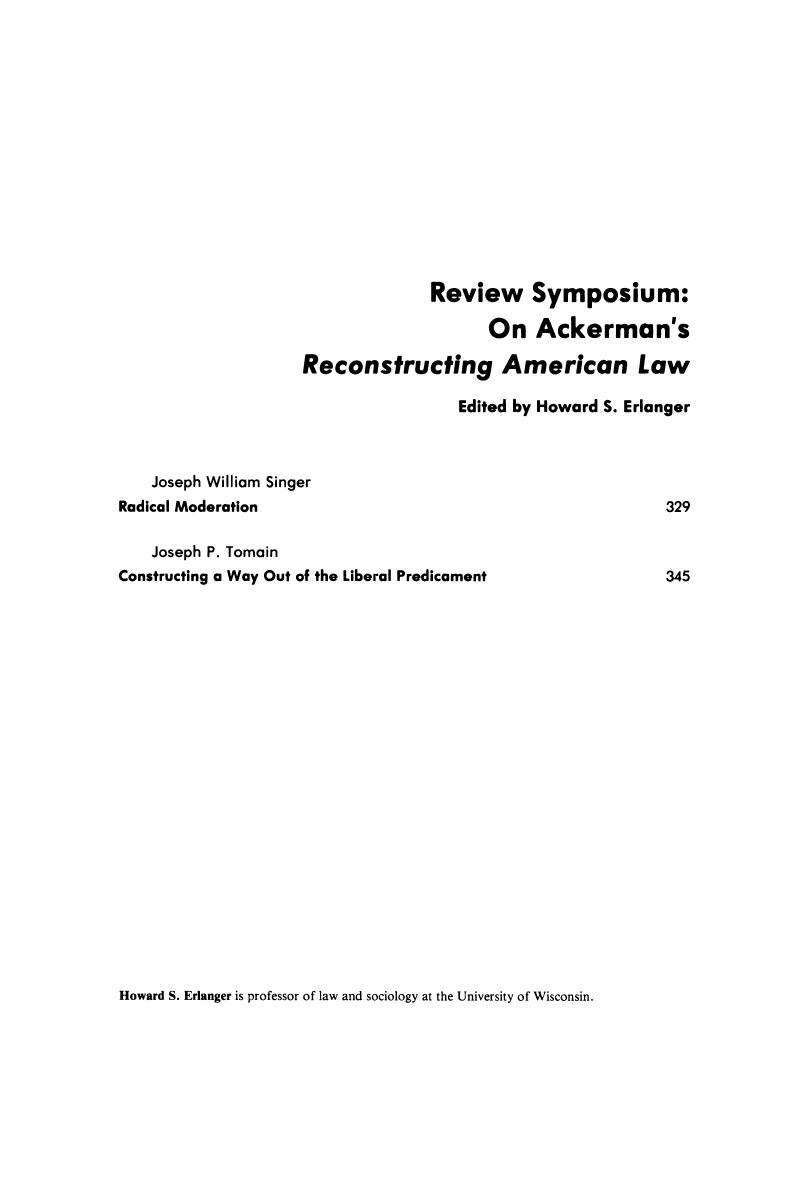No CrossRef data available.
Article contents
Radical Moderation
Published online by Cambridge University Press: 20 November 2018
Abstract

- Type
- Review Symposium: On Ackerman's Reconstructing American Law
- Information
- Copyright
- Copyright © American Bar Foundation, 1985
References
1 Geertz, Clifford, Anti Anti-Relativism, 86 Am. Anthropologist 263, 265 (1984).Google Scholar
2 Miller, Alice, Thou Shalt Not Be Aware: Society's Betrayal of the Child 8, trans. Hildegarde Hannum & Hunter Hannum (1984).Google Scholar
3 Cf. Madeleine L'Engle, A Wrinkle in Time 3, s (1962). This story, or one very much like it, was recounted by Wayne Roberge at the 1976 graduation ceremony at Williams College, Williamstown, Mass.Google Scholar
4 St. Thomas Aquinas, The Human Wisdom of St. Thomas Aquinas 49, trans. Drostan MacLaren, ed. Joseph Pieper (1948).Google Scholar
5 On the decline of the idea of a self-regulating market, see Morris Cohen, Property and Sovereignty, 13 Cornell L.Q. 8 (1927); id., The Basis of Contract, 46 Harv. L. Rev. 553 (1933); Robert Gordon, Critical Legal Histories, 36 Stan. L. Rev. 57 (1984); Hale, Robert, Coercion and Distribution in a Supposedly Non-coercive State, 38 Pol. Sci. Q. 470 (1923); id., Bargaining, Duress, and Economic Liberty, 43 Colum. L. Rev. 603 (1943); Horwitz, Morton, The History of the Public/Private Distinction, 130 U. Pa. L. Rev. 1423 (1982); Kennedy, Duncan, Form and Substance in Private Law Adjudication, 89 Harv. L. Rev. 1685 (1976); Mensch, Betty, Freedom of Contract as Ideology, 33 Stan. L. Rev. 753 (1981); Robert Gordon, New Developments in Legal Theory, in David Kairys, ed., The Politics of Law: A Progressive Critique 281 (1982).Google Scholar
On the decline of formalist legal reasoning, see Cohen, Felix, Transcendental Nonsense and the Functional Approach, 35 Colum. L. Rev. 309 (1935); John Dewey, Logical Method and Law, 10 Cornell L.Q. 17 (1924); Kennedy, Duncan, Toward an Historical Understanding of Legal Consciousness: The Case of Classical Thought in America, 1850–1940, 3 Research L. & Soc. 3 (1980); Roscoe Pound, Liberty of Contract, 18 Yale L.J. 454 (1909); id., Mechanical Jurisprudence, 8 Colum. L. Rev. 605 (1908); Singer, Joseph, The Legal Rights Debate in Analytical Jurisprudence from Bentham to Hohfeld, 1982 Wis. L. Rev. 975; Vandevelde, Kenneth, The New Property of the Ninteenth Century: “The Development of the Modern Concept of Property, 29 Buffalo L. Rev. 325 (1980); Benjamin Cardozo, The Nature of the Judicial Process (1921); Grant Gilmore, The Ages of American Law (1977); Elizabeth Mensch, The History of Mainstream Legal Thought, in David Kairys, ed., The Politics of Law, supra, at 18; Edward Purcell, The Crisis of Democratic Theory: Scientific Naturalism and the Problem of Value (1973). See also Hynes v. New York Cent. R.R. Co., 231 N.Y. 229, 131 N.E. 898 (1921) (Cardozo, J.).Google Scholar
6 It has been revived, however, in recent years by the conservative branch of the law and economics movement. See Kelman, Mark, Consumption Theory, Production Theory, and Ideology in the Coase Theorem. 52 S. Cal. L. Rev. 669 (1979).Google Scholar
7 See also Morton Horwitz's discussion of this point in Richard Epstein, Charles Gregory, & Harry Kalven, Cases and Materials on Torts 171 (4th ed. 1984); The T. J. Hooper, 60 F.2d 737 (26 Cir. 1932) (Hand, J.).Google Scholar
8 Gordon, Critical Legal Histories, supra note 5, at 104. Ackerman seems to understand this point imperfectly. He recognizes that the legal realists criticized the abstractions of classical legal rhetoric (see, e.g., at 19) but relates this practice only to the legal realist critique of deductive legal reasoning and not to the idea of the self-regulating market. He equates the attack on laissez-faire policies with the statutory and administrative regulation of the New Deal era (see at 6–22). But the legal realists criticized the idea of the self-regulating market long before the New Deal. See, e.g., Morris Cohen, Property and Sovereignty, supra note 5; Robert Hale, Coercion and Distribution, supra note 5. The increased willingness to apply administrative regulation to the market is distinct from the recognition that even a laissez-faire economy constitutes a form of regulation because the legal system defines the property and contract rules that determine the relative bargaining power of different groups in the market. See Duncan Kennedy & Frank Michelnian, Are Property and Contract Efficient? 8 Hofstra L. Rev. 711 (1980).Google Scholar
9 See, e.g., Gerald Frug, The Ideology of Bureaucracy in American Law, 97 Harv. L. Rev. 1276 (1984); Peter Gabel & Paul Harris, Building Power and Breaking Images: Critical Legal Theory and the Practice of Law, 11 N.Y.U. Rev. L. & Soc. Change 369 (1982–83); Catharine MacKinnon, Toward a Feminist Jurisprudence, 34 Stan. L. Rev. 401 (1982); Frances Olsen, The Family and the Market, 96 Harv. L. Rev. 1497 (1983); Joseph Singer, The Player and the Cards: Nihilism and Legal Theory, 94 Yale L.J.1 (1984).Google Scholar
10 see also Ackerman, Bruce, Regulating Slum Housing Markets on Behalf of the Poor: Of Housing Codes, Housing Subsidies and Income Redistribution, 80 Yale L.J. 1093 (1971); Duncan Kennedy, Distributive and Paternalist Motives in Contract and Tort Law, with Special Reference to Compulsory Terms and Unequal Bargaining Power, 41 Md. L. Rev. 563 (1982).Google Scholar
11 Coase, Ronald, The Problem of Social Cost, 3 J. Law & Econ. 1 (1960); Harold Demsetz, When Does the Rule of Liability Matter? 1 J. Legal Stud. 13 (1972).Google Scholar
12 “‘[L]aw and economics’ permits a vast enrichment of the conversational resources available to lawyers trying to make sense of the legal foundations of an activist state” (at 44).Google Scholar
13 Kennedy, Duncan, Cost-Benefit Analysis of Entitlement Problems: A Critique, 33 Stan. L. Rev. 387 (1981).Google Scholar
14 See Michelman, Frank, Property, Utility and Fairness: Comments on the Ethical Foundations of ‘Just Compensation’ Law, 80 Harv. L. Rev. 1165, 1214–15 (1967).Google Scholar
15 Ackerman argues that we should focus on “the varieties of market failure” (at 71), meaning how “market imperfections hampered the participants' efforts to reorganize their activities in light of existing and proposed legal rules” (at 73).Google Scholar
16 Frug, Gerald, The Ideology of Bureaucracy in American Law, 97 Harv. L. Rev. 1276, 1365 (1984).Google Scholar
17 “[T]he transformation of legal discourse” (at 2); “the new rhetoric,”“a distinctive form of legal discourse … a new language of power” (at 3); “the new law-talk,”“a new language of power” (at 4); “legal discourse,”“activist law-talk” (at 23); “a new language of power” (at 94); “a new form of power talk” (at 46); “a common legal language” (at 59–60).Google Scholar
18 See also “a professionally disciplined effort” (at 59–60); “legally constrained conversation” (at 97).Google Scholar
19 Ackerman, Bruce, Social Justice in the Liberal State (1980).Google Scholar
20 It is impossible to assess the adequacy of this method without reading Ackerman's other book. Other than the above phrases, this book does not explain the method at all. It is also somewhat surprising that Ackerman considers his method revolutionary. In fact, his emphasis on the principle of neutrality is a modified version of arguments that have pervaded liberal discourse since the seventeenth century. See, e.g., John Locke, A Letter Concerning Toleration 13 (Bobbs-Merrill, 1950) (originally published 1689) (“everyone is orthodox to himself”); Thomas Hobbes, Leviathan 120, ed. C. B. MacPherson (1968) (originally published in 1651) (“For these words of Good, Evill, & Contemptible, are ever used with relation to the person that useth them: there being nothing simply and absolutely so; nor any common Rule of Good and Evill, to be taken from the nature of the objects themselves.”); id., at 109 (“For one man calleth Wisdome, what another calleth feare; and one cruelty what another justice; one prodigality, what another magnanimity, and one gravity, what another stupidity, etc.“) (emphasis in original); id. at 314–18, 322–23 (arguing that despite disagreements among individuals about right and wrong, natural law has a substantive content that can be applied by judges).Google Scholar
21 “In a democratic activist state, it is up to the People, and not their lawyers, to decide upon the activist principles that will inform the legal system. If lawyers do not like the principles, P, that the People have chosen, they can try to persuade the People to change their mind. In the meantime they have a democratic obligation to bse P in legal argument, rather than the not+ they favor in politics” (at 79).Google Scholar
22 See Singer, , supra note 9; Michael Sandel, Liberalism and the Limits of Justice 9–10 (1982).Google Scholar
23 This is not the place to demonstrate the indeterminacy of Ackerman's method of neutral conversation. In Reconstructing American Law, Ackerman nowhere applies his method, so there is nothing to criticize. Such a demonstration would properly occur in a critique of Social Justice in the Liberal State. See Singer, supra note 9.Google Scholar
24 Katz, Al, Studies in Boundary Theory: Three Essays in Adjudication and Politics, 28 Buffalo L. Rev. 383, 435 (1979).Google Scholar
25 Schoenberg, Arnold, Foreword to Drei Satiren fur gemischten Chor, opus 28 (Three Satires for Mixed Chorus) in 18 Saemtliche Werke: Chorwerke 1,66 (Complete Works: Choral Works I), ed., Rudolf Stephan, trans. Roberto Unger (1980) (“Denn der Mittleweg is der einzige, der nicht nach Rom fuhrt”).Google Scholar
26 Aristotle, Ethics 35, trans. John Warrington (1963) (“virtue must aim at the intermediate”).Google Scholar
27 Ackerman seeks to combat the idea that “all normative judgments are arbitrary” (at 82). He is determined to move beyond the “intuitionistic approach to value articulation” favored by the legal realists and certain proponents of critical legal studies (at 72). See also at 38, 95. He hopes to achieve a “disciplined way to examine initial intuitions” (at 96).Google Scholar
28 Singer, supra note 9.Google Scholar
29 Geertz, supra note 1, at 265.Google Scholar
30 Activist lawyers “call …for the systematic test of particular activist interventions by legal principles that seek to capture the basic ideals that have led the American people to embrace activism in the first place” (at 20). My description of the rationalist position is exaggerated to highlight the differences between the rationalist approach and the pragmatic approach to legal reasoning. All rationalists acknowledge that judges exercise a substantial amount of discretion in making or applying law. Nonetheless, the emphasis in their theories is first, on providing an “objective” foundation for their first principles, and second, on demonstrating that those first principles are helpful in generating outcomes, even though they do not determine everything. The goal is to demonstrate that their theories create the proper mix of determinacy and indeterminacy. To demonstrate this, however, requires them to spend a great deal of time showing the extent to which their theories are determinate, or that they at least constrain choice within acceptable boundaries. For a full elaboration of this argument, see Singer, supra note 9; Roberto Unger, The Critical Legal Studies Movement, 96 Harv. L. Rev. 561, 567–76 (1983).Google Scholar
31 “A strange game. The only winning move is not to play.” Lawrence Lasker & Walter Parkes, War Games (motion picture screenplay) (1982).Google Scholar
32 See Shepard, Jim, Flights 8 (1984).Google Scholar


